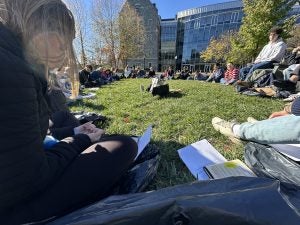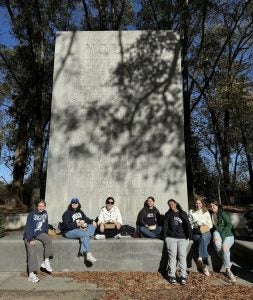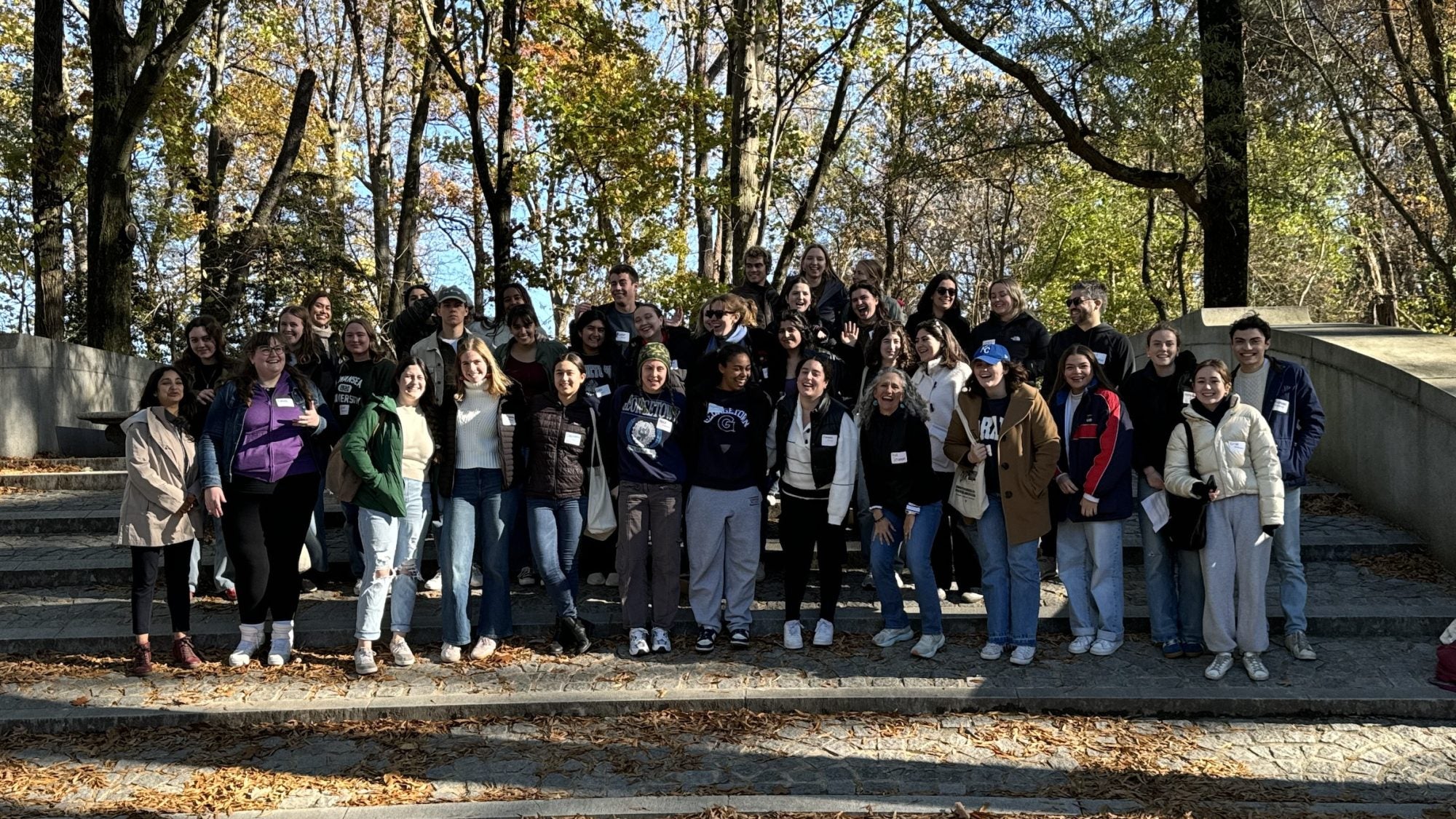Sydney is a Georgetown Storyteller and sophomore in the College of Arts & Sciences from Nashville, Tennesse. When she’s not working on Georgetown Stories, you can find her playing with the Georgetown club field hockey team or writing for The Voice.
I applied to Georgetown assuming I would major in government. Because I’m annoying, I decided against it, since everyone else was doing it — no shade to any of my gov major friends.
Before coming to Georgetown, I met a senior at Georgetown at Coffee Republic —then Saxby’s!— to talk about her experience at Georgetown. When I explained how I hadn’t found a great fit for my major, she told me that some of her friends were American studies majors, which she explained was the “boho version” of a government major
My interest? Piqued.
I was interested in American studies, but it was very unclear to me exactly what it was — was it history? English? Politics? I’d soon discover that it’s all of those.
The summer before my freshman year, I applied to a freshman seminar called Race and Class in DC, which examines the city’s racial and socioeconomic dynamics. I really enjoyed the course’s interdisciplinary aspects and how we centered our study in un-learning common narratives before re-learning untold ones. Unbeknownst to me, this was actually an American studies class. Many of my classmates were also interested in American studies, and the class practiced the interdisciplinary approach that I would come to learn dominates the major’s curriculum.
The way American studies works is very different to most other majors on campus. The major is focused on building an intellectual comm unity, which is why the major is limited to a cohort of around 30 students per grade. The major’s core classes also begin sophomore year, with all students in your cohort taking the same classes together.
unity, which is why the major is limited to a cohort of around 30 students per grade. The major’s core classes also begin sophomore year, with all students in your cohort taking the same classes together.
As a result, it’s one of the few majors on campus that requires an application. If a student is interested in American studies, they complete an application at the end of their first year. This application doesn’t mean that they’re declaring American studies as their major, rather, it just allows them to be considered for the first core course in the program, Origins & Identities, which is taken in the fall semester of sophomore year.
I was lucky enough to be accepted into my cohort, and I’m now enrolled in Origins & Identities, which explores how origin stories about America are told, which ones aren’t told, and the ways in which these narratives shape the American identity. American studies focuses on an interdisciplinary approach — which essentially means that if you ask any American studies major what American studies actually is, they’ll either go on a 20-minute tangent or tell you that it’s just complicated.
For me, American studies enables me to combine my myriad interests in the humanities into one major. There’s a lot of writing involved, a deep study of historical texts and trends, and a look at the way art contributes to American culture. At the core of the major is an attempt to understand the histories of women, immigrants, LGBTQ, disabled, and other marginalized Americans, and how their version of America differs from dominant narratives.
American studies also features a year-long senior thesis, which encourages a deep dive into one aspect of American culture. The topic can be as universal or as specific as you can imagine — one senior I k now is currently researching the founding and construction of Gay People of Georgetown University, a group that advocated for equal recognition and access to university benefits, which eventually grew into the GUPride that we know and love today.
now is currently researching the founding and construction of Gay People of Georgetown University, a group that advocated for equal recognition and access to university benefits, which eventually grew into the GUPride that we know and love today.

Students last year had theses on everything from how the comedy style of Parks and Recreation reflected realistic American life to representations of the U.S. women’s national soccer team in the 2023 World Cup. While we’re often warned that the thesis process is long, arduous and incredibly time-consuming, seniors and alumni of the program have told me that it’s one of the most rewarding experiences of the major.
American studies is also footed in community building. American studies students, or AMStuds, are involved in a community that goes beyond the classroom and beyond one’s individual cohort. The major has a buddy system that pairs students so that sophomores have people they can go to with questions, concerns or just general thoughts. AMStuds also take a group field trip each semester to a place important to American culture, which can be as far or as close to campus as you can think. This semester, we’re taking a trip (read: walk) to Roosevelt Island!
You also take at least one class per semester as a cohort, which often involves rich group discussions. While I already knew many in my cohort from my Race and Class in DC seminar, I’ve enjoyed getting to know the others in my class. Knowing how much time we’ll have to spend together, I’m glad that I enjoy their company!
While I’m less than a semester into American studies, I’m enjoying it so far, and I’m excited to see how the next two years will take shape. I chose this major because I value the community it builds, the discussions it provokes and the mindset it helps build. I’m just lucky that American studies chose me back and that I get to be a part of this community throughout my experience at Georgetown and beyond.
